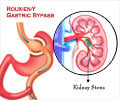DURHAM, N.C. -- Advances in weight-loss surgery have made it as safe as any routine surgical procedure, according to a Duke University Medical Center researcher who reviewed data from
According to a Duke University Medical Center researcher who reviewed data from nearly 60,000 patients, advances in weight-loss surgery have now made the procedure as safe as any routine surgery. He also found that the weight loss surgery resulted in low complication and mortality rates.
The analysis, compiled from the largest repository of bariatric surgery patients ever recorded, indicates complication rates hover around 10 percent – with the most common complaint being nausea/vomiting. Total mortality rate was under one percent (0.135%) with 78 deaths reported among 57,918 patients."The complication and mortality rates are even lower than have been reported in the past," says Eric J. DeMaria, MD, vice chair of the department of surgery at Duke, who presented the findings at the annual meeting of the American Society for Metabolic and Bariatric Surgery in Grapevine, TX. The data was accrued from participants in the ASMBS Bariatric Surgery Centers of Excellence program. All follow identical guidelines. "We believe the Bariatric Surgery Centers of Excellence program is one reason why there is an even further reduction in mortality being observed," says DeMaria.
More than 200,000 people undergo bariatric surgery each year, according to the ASMBS, making it one of the most commonly performed procedures in the U.S.
The safety results are the first to be derived from the Bariatric Outcomes Longitudinal Database (BOLD), compiled by the Surgical Review Corporation. The SRC is an independent, non-profit organization whose mission is to advance the safety, efficacy and efficiency of bariatric and metabolic surgical care worldwide. . SRC has designated nearly 650 surgeons and more than 350 hospitals and freestanding outpatient facilities since launching the centers of excellence for bariatric surgery in 2003.
In this first analysis of bariatric surgery patients, the report found:
- Nearly all (94.08%) are between the ages of 19-65. Less than one percent (.14%) are under 19 while 5.67% are older than 65.
- Three-quarters (78.76%) are women.
- Most are Caucasian (78.12%). African Americans comprise 10% of the patient population; Hispanics, Asians and Native Americans make up the rest.
- More than half of the procedures performed are gastric bypass (54.8%), followed by gastric banding (39.8%).
Advertisement
"This is just the beginning," he added. "This enormous database will help us develop risk stratification guidelines for patients so we will know definitively what the risks are for a certain type of patient, and will then be able to focus on how to improve those risks. It also allows researchers to look at less common issues with more information than we've ever had before."
Advertisement
Source-Eurekalert
TAN












